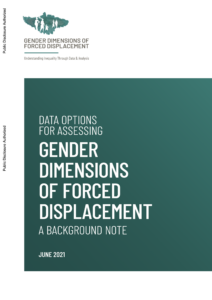Forced displacement has profound impacts on lives and livelihoods, which creates enormous demands on government and other stakeholders seeking to support affected populations. Yet, designing and implementing policies that are effective, ethical, and equitable has been severely limited due to a lack of empirical research.
Rigorous evidence on the causes, characteristics and consequences of forced displacement remains scarce, especially on their gender dimensions. This is primarily due to a lack of suitable, high-quality micro data. However, there has been important progress in collecting high-quality micro data in fragile and conflict-affected situations over the past decade, including in contexts of forced displacement.
This note provides a summary of existing data that are of potential use for the analysis of gender and displacement, as a tool for researchers who wish to fill the evidence gaps. The note is based on an extensive review of a large variety of data sources and was organized around four specific topics of broad interest: gender-based violence, multi-dimensional poverty, economic opportunities and child development.





